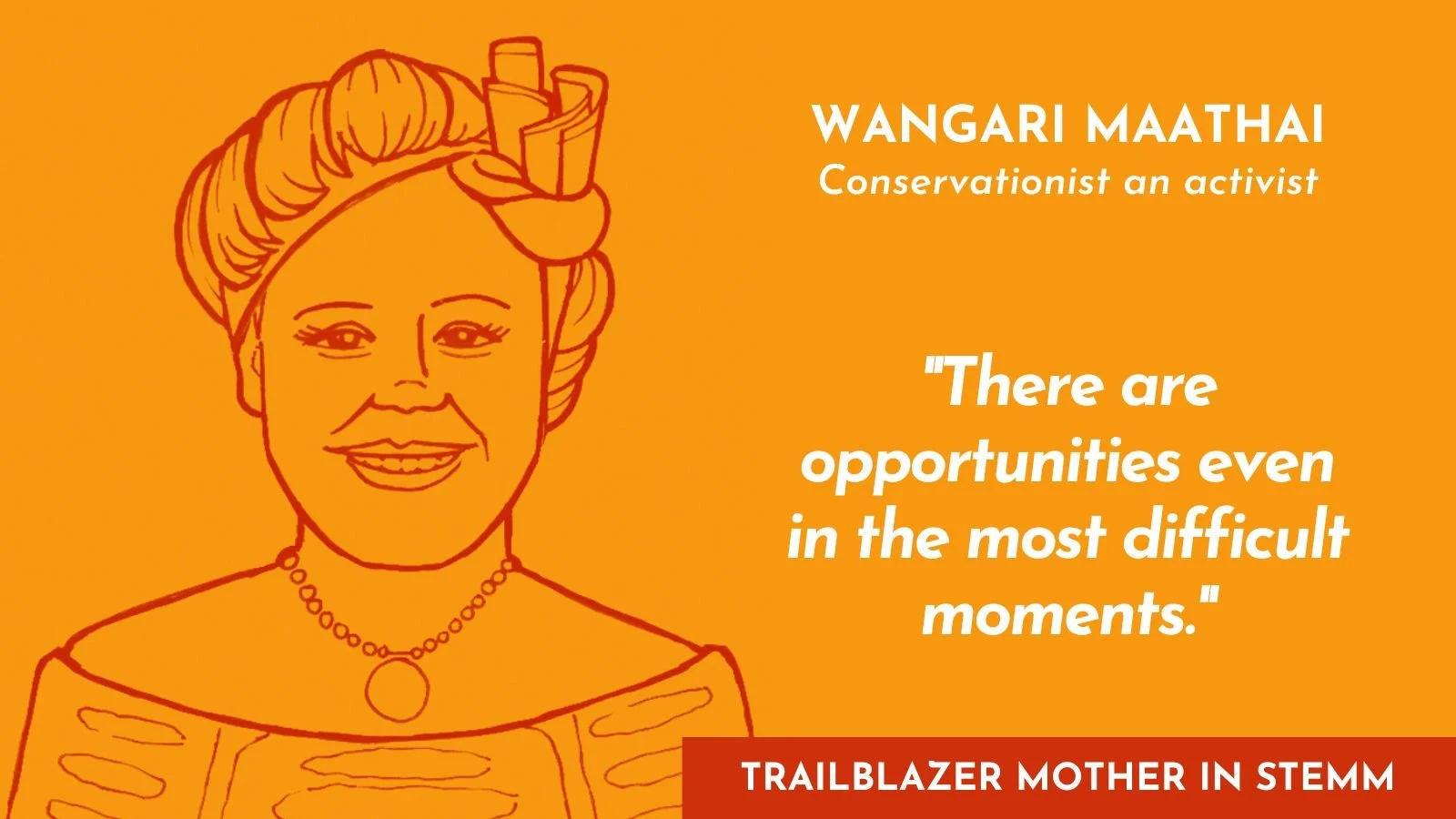Wangari Maathai
Wangari Maathai (1940–2011) was a Kenyan conservationist, academic, and activist who fought tirelessly and bravely for the reforestation of Kenya and women’s rights. She was the first African woman to receive the Nobel Peace Prize and was a mother to three children.
Wangari Maathai spent her childhood years in the central highlands of Kenya, a rural farming region that at the time was covered in thick vegetation with clean water and fertile soils. Her mother and father both worked on farms. After completing her schooling, where she was rated first in her class, she obtained a scholarship to continue her studies in the United States (US). There she obtained a Bachelor’s degree in biology in 1964 from Mount St. Scholastica College in Kansas. She then spent a further couple of years in the US, earning a Master’s degree in biological sciences from the University of Pittsburgh in 1966. It was while living in America during the 60s, a well-described time of social and political unrest, that she developed a sense of injustice around the undemocratic governance of Kenya, a newly independent country following decades of British colonization. After completing her Master’s, she returned to Kenya with a strong conviction to instigate change. Following a brief stint in Germany, she was awarded a PhD in veterinary anatomy from the University of Nairobi in 1971, becoming the first woman in East and Central Africa to obtain a doctorate degree.
From academic research to environmental activism
She began her academic career by teaching in the Department of Veterinary Anatomy at the University of Nairobi, eventually progressing to chair in 1977, which made her the first female professor in Kenya. Working as an academic, she became involved in groups centred around women’s rights, and in particular, the National Council of Women of Kenya. It was during this time that she developed her idea for reforestation of the local environment. Maathai learnt that local women were cutting down trees to use for firewood. As she had grown up in a similar rural region, but before deforestation had begun in earnest, she was able to connect the dots between this activity and the deteriorating environmental conditions that were causing poor harvests and affecting food supply. Maathai envisioned reforestation of the local environment as a solution to this problem.
To implement her vision, she set up the Green Belt Movement in 1977, a grassroots initiative aimed at empowering and educating women and their communities to plant trees. Crucially, Maathai was able to understand the impact of poverty in tackling environmental concerns, and as such, ensured the women were paid for their work. Since its inception, the Green Belt Movement has supported local communities to plant more than 51 million trees across rural Kenya. It is still in action today and has offices in Nairobi, Washington DC, and London. Maathai also established the Pan African Green Belt Network to implement her successful approach in other African countries such as Tanzania, Ethiopia, and Zimbabwe.
Through her pioneering work with the Green Belt Movement, Maathai was introduced to the global stage, a role she adapted to with ease. In addition to her conservation work, she became a spokesperson for human rights issues, often addressing the United Nations (UN) on these matters. She received many accolades, not least, the Nobel Peace Prize in 2004 for ‘her persistent struggle for democracy, human rights and environmental conservation’; again another first – being the first African woman to receive this award. She was eventually elected to Kenya’s parliament and became Assistant Minister of the Environment, Natural Resources, and Wildlife. She was appointed an UN Messenger of Peace to focus on the environment and climate change, a role she held until her passing in 2011.
Balancing motherhood and a challenging career in activism
Maathai’s formidable achievements were not without personal struggle and sacrifice. Her work with the Green Belt Movement and its intention to empower local people brought her into direct conflict with the undemocratic and often corrupt Kenyan government. She was an activist in the true sense of the word and fought bravely to advocate for what she believed in, even at physical cost to herself, landing in prison and hospital at various points in her life.
She married Mwangi Mathai, a Kenyan politician in 1969, and they had three children together. Her husband left her after eight years of marriage and they were divorced two years later. Due to financial reasons, Maathai spent a portion of her children’s younger years in a job that required extended periods of travel, meaning that her children often lived with their father. Despite what must have been difficult decisions for a mother to make, she was an admirable role model for her children. She instilled in them her sense of justice and fairness, and taught them the importance of solidarity and the need to consistently stand up for what you believe in. Maathai’s daughter, Wanjira Mathai, has since followed in her mother’s footsteps and is now also engaged in environmental and reforestation activism in Africa.
Maathai passed at the age of 71 after a battle with ovarian cancer. She was undoubtedly a visionary scientist and mother, someone who wore many hats and succeeded across sectors. She was a motivating advocate for conservation and women’s rights, while staying loyal to her African heritage. Her belief in the power of local action and her willingness to share her unique perspective on the world is an inspiring example of what can be achieved when one is brave enough to do so.
Written by Rachel James
22/04/2024
Further reading materials:
General information:
https://www.britannica.com/biography/Wangari-Maathai
https://wangarimaathai.org/
http://www.greenbeltmovement.org/
https://www.nobelprize.org/prizes/peace/2004/maathai/biographical/
https://www.un.org/en/messengers-peace/wangari-maathai
Newspaper articles:
https://www.theguardian.com/world/2011/sep/26/wangari-maathai
https://www.nytimes.com/2004/10/09/world/africa/like-a-tree-unbowed.html
https://www.bbc.co.uk/news/science-environment-15060167
Interviews:
https://www.motherjones.com/politics/2005/01/root-causes-interview-wangari-maathai/
https://www.feminist.com/resources/artspeech/interviews/wangarimaathai.html
https://www.boomplay.com/episode/3905250

